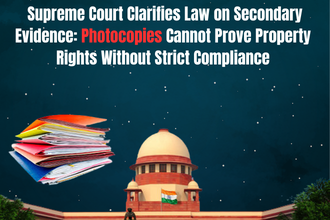The Supreme Court of India has recently clarified the scope of Section 100 of the Civil Procedure Code (CPC), emphasizing that High Courts must provide clear reasons before framing any additional question of law during second appeals. In its judgment delivered on September 3, 2025, the Bench comprising Justice Ahsanuddin Amanullah and Justice SVN Bhatti laid down guiding principles to prevent arbitrary exercise of this judicial power.
The ruling came in the case of C.P. Francis v. C.P. Joseph and Others, where the Court dealt with the interpretation of Section 100(5) CPC, which allows the High Court to frame an additional question of law at the hearing of a second appeal.
Background of the Case
Under the CPC framework, a second appeal to the High Court is permissible only on a “substantial question of law.” Section 100 CPC was amended in 1976 to narrow the scope of second appeals, with the objective of curbing unnecessary prolongation of civil litigation.
Section 100(5) contains a proviso empowering High Courts to frame an additional substantial question of law during the hearing of the appeal, even if it was not initially raised. However, this discretion must be exercised with caution and only in exceptional cases.
In C.P. Francis v. C.P. Joseph, the High Court had invoked this proviso without providing adequate reasoning. The aggrieved party challenged the decision before the Supreme Court, arguing that the High Court acted mechanically and expanded the scope of appeal contrary to the legislative intent of Section 100 CPC.
Supreme Court’s Observations
The Supreme Court highlighted several key principles:
- Reasons are Mandatory
- The Bench held that whenever a High Court frames an additional substantial question of law, it must assign specific reasons explaining why such framing is necessary.
- A bald or mechanical reference to “substantial question of law” is insufficient. The reasoning should demonstrate how the question arises from the pleadings or findings of lower courts.
- Exceptional Power, Not Routine
- The Court clarified that the proviso to Section 100(5) CPC is meant to serve justice in exceptional situations where a significant legal issue has been overlooked.
- This provision cannot be invoked routinely, otherwise it would defeat the restrictive framework intended by Parliament in 1976.
- Balance Between Finality and Justice
- The Court reiterated that the principle of finality of litigation must be respected. At the same time, if a genuine question of law arises, justice demands that it be considered.
- Therefore, the High Court must strike a careful balance between the two.
- Structured Judicial Discipline
- The Bench stressed the importance of structured judicial reasoning.
- Simply stating that “an additional question of law arises” without analysis is a violation of judicial discipline and may amount to an error of jurisdiction.
Key Excerpts from the Judgment
The Court observed:
- “The power under the proviso to Section 100(5) CPC is not unfettered. It is a discretionary power that must be exercised sparingly, with the reasons duly recorded. To permit otherwise would open the floodgates of prolonged litigation and undermine the purpose of restricting second appeals only to substantial questions of law.”
- “Recording reasons ensures transparency and accountability in judicial functioning. It safeguards litigants against arbitrary expansion of the scope of second appeals.”
Legal Significance of the Ruling
The judgment provides much-needed clarity on how second appeals should be handled by High Courts:
- Prevents Abuse of Process: By mandating reasons, the Court has curbed the possibility of High Courts indiscriminately framing fresh questions of law.
- Strengthens Finality: Civil disputes often drag on for decades. By limiting additional questions of law, the judgment reinforces finality and reduces delays.
- Guides the Judiciary: The principles laid down will serve as binding precedent for High Courts across India, ensuring uniformity in approach.
Section 100 CPC – A Brief Overview
To understand the importance of this ruling, a quick recap of Section 100 CPC is useful:
- Pre-Amendment (Before 1976): High Courts could entertain second appeals on questions of law or fact, leading to excessive backlog.
- Post-Amendment (1976): Second appeals are restricted only to substantial questions of law.
- Section 100(5) Proviso: Allows framing of an additional substantial question of law at hearing, but subject to judicial discipline.
Thus, the Supreme Court has reaffirmed the legislative intent behind the amendment — to limit the scope of second appeals and prevent misuse.
Case Citation
- Case Title: C.P. Francis v. C.P. Joseph and Others
- Bench: Justice Ahsanuddin Amanullah and Justice SVN Bhatti
- Date of Judgment: September 3, 2025
- Provision Involved: Section 100(5) CPC
Broader Impact
- For Litigants: The ruling ensures that litigants are protected from endless rounds of litigation caused by new legal questions being introduced at a late stage without justification.
- For Lawyers: Advocates appearing in second appeals must now be prepared to argue why an additional question of law should or should not be framed, with reference to pleadings and judgments of the lower courts.
- For the Judiciary: High Courts will now have to exercise greater care, ensuring detailed reasoning while invoking Section 100(5).
Conclusion
The Supreme Court’s decision in C.P. Francis v. C.P. Joseph and Others is a landmark interpretation of Section 100 CPC. It reaffirms the principle that second appeals are not meant to be a third round of fact-finding, but are confined strictly to substantial questions of law.
By requiring High Courts to record reasons before framing any additional question of law, the Court has strengthened judicial accountability, protected litigants from unnecessary delay, and reinforced the finality of judgments.
This ruling will have far-reaching consequences in civil litigation, serving as a crucial reminder that judicial discretion, though broad, must always be exercised within the limits of law and with transparent reasoning.
Also Read


